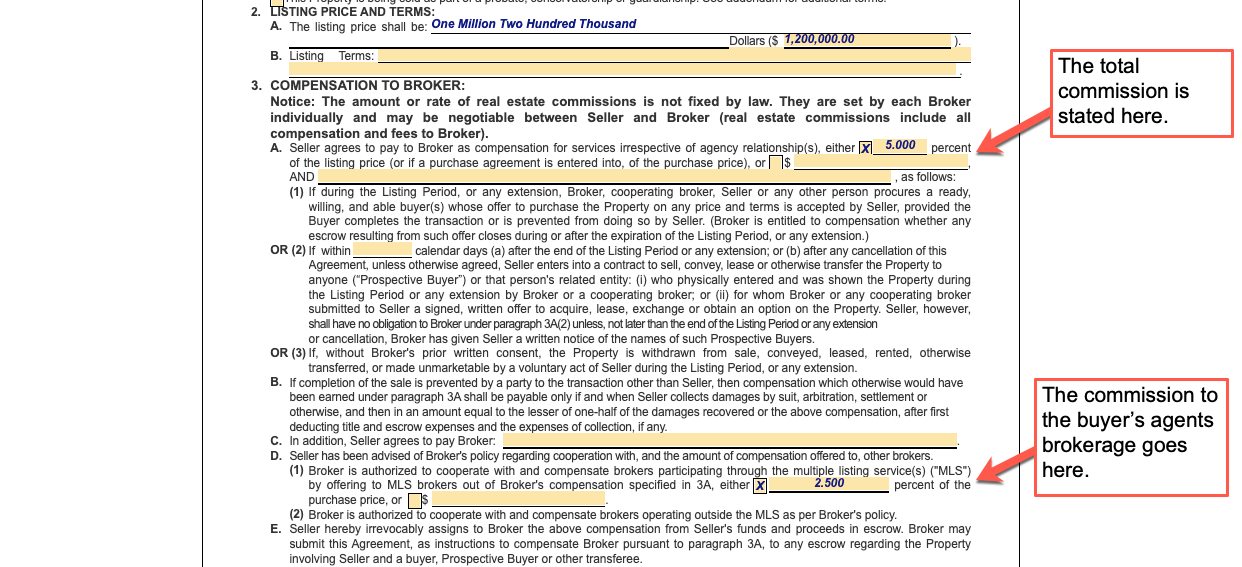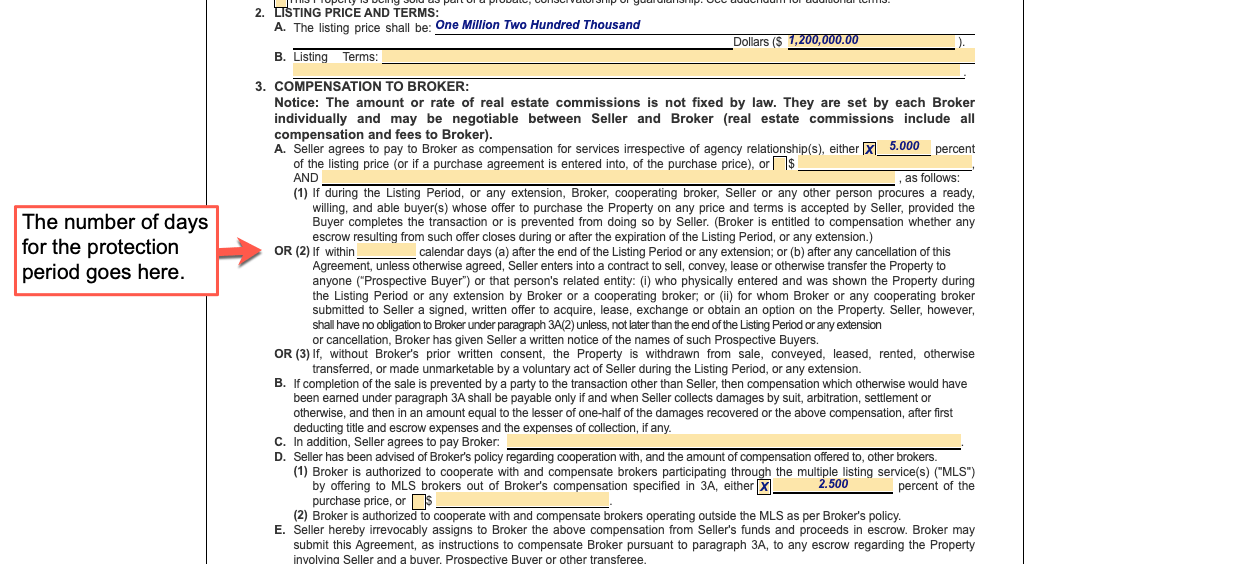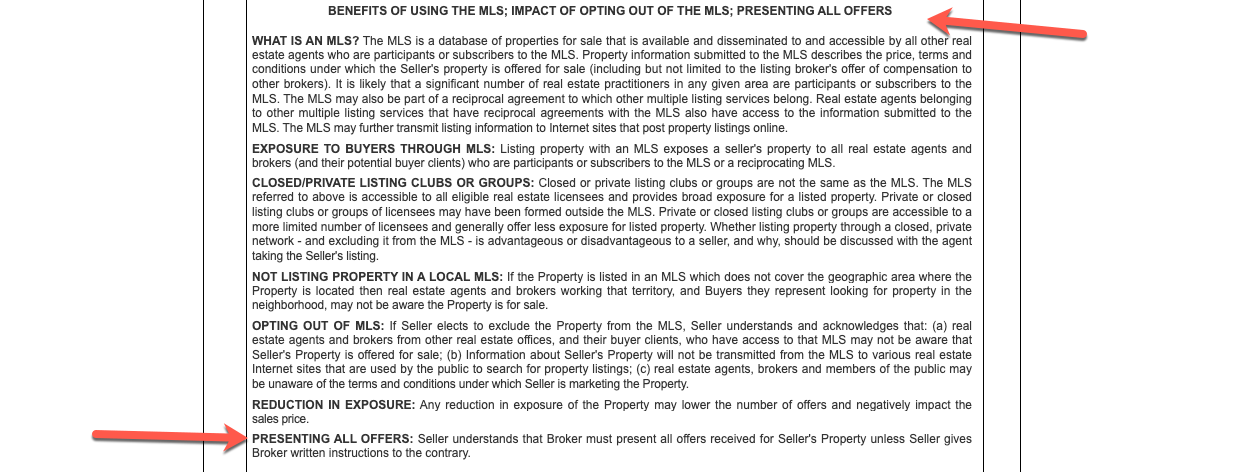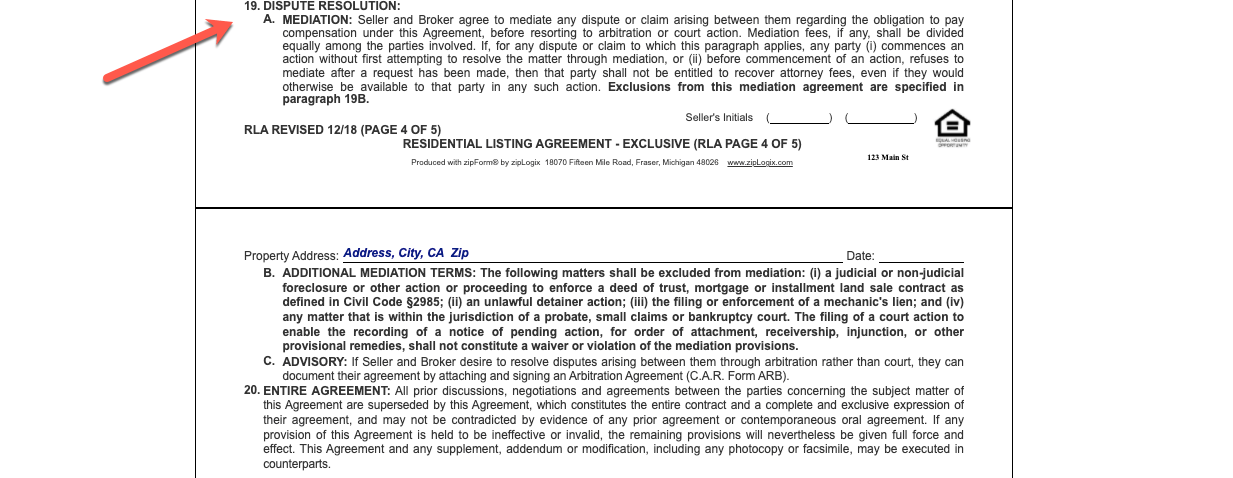

A listing agreement is a legally binding contract between you — the homeowner — and the real estate broker (and agent) you hire to sell your property.
It’s a contract that outlines the realtor-seller relationship during a real estate transaction.
It’s common for sellers to go through the process of hiring a realtor without having any knowledge about the listing contract.
This can lead to confusion, miscommunication, and sometimes even legal disputes with a real estate agent.
Let’s help you avoid all of that.
Here’s what you should know about the listing agreement when selling your home.
A listing agreement essentially grants authority to the real estate brokerage (company) your listing agent works for to act on your behalf.
A real estate agent has a “salesperson” license that allows them to work with a seller –– but in order to do so, they must “hang” their license with a broker.
This is why you technically need a real estate broker when selling your home with a realtor.
And it’s why the listing agreement is between you and your agent’s brokerage.
Think of it as a seller broker agreement that’s an employment contract, valid for an agreed-upon timeframe.
You’re hiring someone to handle a major financial transaction, and the listing contract makes it official.
And just like any employment contract, the agreement outlines important details of the alliance.
At a high level, a real estate listing agreement contains details such as:
But there’s one caveat…
The definition of each party’s roles and responsibilities and how the broker is compensated depends on which type of listing agreement is used.
There are a few different types of listing agreements that can be used to define the working relationship between a seller and their real estate broker/agent.
Here are the three most common.
The exclusive right to sell listing agreement gives your real estate agent (and their brokerage) exclusivity to sell your property.
This means that you cannot hire another agent during the duration of the contract.
Your listing agent takes on all responsibilities of selling your home — and you pay them the agreed-upon commission once the property sells.
The exclusive right to sell agreement is the most commonly used type, and the one you’ll most likely be executing with your real estate agent.
An exclusive agency agreement is similar to the exclusive right to sell, except for one thing: If the seller finds a buyer, then their real estate agent is not owed a commission.
This is more common when a seller is thinking of taking the “for sale by owner” route but wants the security of having a real estate agent.
Most experienced listing agents won’t agree to this type of contract.
Because these types of listing agreements open up the possibility of a real estate agent working for free.
This type of listing arrangement means exactly what it says — open.
The open listing agreement allows a seller to work with multiple real estate agents, while still allowing them to try to sell the property themselves.
Whichever agent brings a buyer is the one who gets paid a commission.
And if the seller finds a buyer, then they don’t pay the listing agent’s commission.
But finding a real estate agent to agree to this type of agreement is nearly impossible.
Okay, now for the fun part.
I’m going to walk you through an example of a standard listing agreement so you can understand its key elements.
Two things before we dive in:
I’ll be using the exclusive right to sell listing agreement (the most common) as we go through different sections.
The timeframe in the agreement is often referred to as the listing period.
There’s a start date and an expiration date that is included on the first page.

You and your realtor will have discussions about what price your house will be listed at.
Here’s an example of where that agreed-upon price is stated in the listing agreement.

The total commission a seller pays is generally split between the listing agent and the buyer’s agent.
That total commission percentage is stated in the listing agreement.
And so is the portion being allocated to the buyer’s real estate agent.
You can see both of those here.

The protection clause in a listing contract protects the seller’s broker from not being paid a commission should they find a buyer for the property who:
It’s listed as the number of days that this clause is valid from when the contract expires.
Here’s what this looks like in the listing agreement:

This section of the agreement acknowledges that the seller has not ratified a listing agreement with another broker.

Do you have any specific items that you would like to include or exclude from the sale of your home?
If so, you can state this in the listing agreement.
In most home sales, anything that is attached to the property will stay (e.g. bathroom fixtures) — so items that can be included or excluded will usually be things such as a refrigerator, washer/dryer, etc.

MLS stands for “multiple listing service,” which is a database of properties for sale that only real estate agents and brokers have access to.
If you want the maximum exposure for your home, you’ll want your house listed on the MLS.
The agreement with your real estate agent states the benefits of using the MLS and the impact that opting out of it could have when selling your property.

There’s a section in the listing agreement that explains the duties of a seller and their real estate broker (and the agent).
The real estate agent is agreeing to exercise a reasonable effort and due diligence to sell the property.
And the seller is agreeing to act in good faith and to consider (not obligated) all offers presented to them.

The agency relationship that is stated in a contract with a listing agent lists the responsibilities of the seller’s broker.
There’s usually a separate disclosure for this that comes attached to the listing agreement.
For states where dual agency (the broker represents both seller and buyer) is allowed (most do), the agreement also explains the agent’s responsibilities in this type of transaction.

Although it’s a rare occurrence, there’s always a chance of something happening when a house is put up for sale (stolen personal property, someone gets injured, etc).
The listing contract states that the seller will not hold their real estate broker liable should anything happen.
It also encourages the seller to purchase insurance that covers these circumstances (if homeowner’s insurance doesn’t already cover it).

This section of the listing agreement gives the seller’s real estate agent permission to include photos and online advertising as part of the marketing.
Both of these are key to maximizing the reach to potential buyers, but a seller must agree to this in writing.

A lockbox allows access for buyer agents to show the home to their clients.
Many lockboxes are electronic and can only be opened through a smartphone app that only real estate agents have access to.
A listing agent can see which real estate agent opened the lockbox and when they closed it.
By acknowledging this section of the listing agreement, the seller is authorizing their real estate agent to put a lockbox on their property.
If there’s a specific reason why you might not want to have a lockbox, then there’s a box for you to check.

This is pretty straightforward.
A real estate agent needs the seller’s permission to put a for-sale sign on their property.
Don’t want a sign on your property?
There’s another box you can check in the listing agreement to state this.

Every type of real estate contract is going to have some legal language describing what happens if there’s a dispute between the parties involved.
It’s no different in a real estate listing agreement.
There’s a mediation and dispute clause that outlines what will happen should a dispute arise between the seller and the real estate agent/broker.
This is a rare occurrence and typically only happens if there’s a disagreement about the commission.
 between the seller and their realtor" width="1233" height="478" />
between the seller and their realtor" width="1233" height="478" />
Not everything included in the listing agreement is set in stone.
Some items in the agreement are negotiable, meaning you have a say in shaping the terms.
The length of the agreement and the real estate commission are the two things that can have the biggest impact on your sale.
So knowing the potential benefits and drawbacks to negotiating both are key.
The length of the listing agreement essentially determines how long you’re tied to a particular real estate broker.
A longer agreement duration gives your agent more time to market your property.
And it also provides them with a sense of security because they’re essentially “guaranteed” a commission as long as your house is sold.
Shorter terms can give you flexibility, especially if you’re uncertain about how to pick a realtor to sell your home.
You won’t be stuck for long if your agent doesn’t meet your expectations.
But the ideal scenario is to negotiate a clause that doesn’t tie you down for any specific time.
While not standard, having the option to cancel at any time (without owing any commissions) can keep your agent motivated to get your home sold quickly and for the best price.
This is why we make this a prerequisite when matching sellers with a top local listing agent.
Match with your best local listing agent We meticulously screen local real estate agents to ensure you're matched with the one best suited to sell your house at the highest possible price.
No pay-to-play agents Less than 24 hours Match With My Best Listing Agent No pay-to-play agents Less than 24 hoursThe total commission a prospective agent proposes will be outlined when they go over the listing agreement with you.
You can negotiate this.
But keep in mind that the lowest commission isn’t always the best deal.
Because reducing an agent’s commission can net you a lower selling price.
Pushing for a lower fee can impact a real estate agent’s motivation to invest the necessary time and resources to get you the highest possible price.
They may cut corners on marketing costs, spend less time on your listing, intentionally price the property for a quick sale, or even minimize their effort when negotiating with the buyer’s agent.
On the flip side, a fair commission can keep your agent motivated to secure you the best outcome.
The promise of a higher reward encourages them to leverage their skills, experience, and networks to help you obtain the best outcome.
In essence, when it comes to how much you pay a realtor for selling your house, you often get what you pay for.
There may come a time when you want to sever ties with the brokerage you hired to sell your home.
The listing agreement will specify the conditions to end that relationship.
But getting out of a contract with a realtor is not always as simple as it might sound.
That’s because the language in the agreement favors your real estate agent and their broker.
The most common listing agreement (exclusive right to sell) gives your brokerage the exclusive right to list your home for the duration of the contract.
That means you’ll need to have a conversation about terminating the agreement if you’re unsatisfied with their services or your circumstances have changed.
It’s not uncommon for a broker to agree to have you work with a different agent from the same brokerage.
But agreeing to mutually release the agreement so that you can hire another broker to sell your house?
You’ll most likely get pushback and a sales pitch about why you need to stay in the contract.
Getting legal advice from an attorney can help you navigate the process if it gets to that point.
Remember, a listing agreement is a contract –– and attempting to break it can make for an uncomfortable situation.
This is another reason why ensuring you have the option to cancel the agreement at any time (without owing any commission) is crucial.
The listing agreement is a critical component of your home-selling journey.
It lays the groundwork for how your relationship with your broker and real estate agent will operate.
And it provides you with a clear understanding of the commission rate, duration of the agreement, and the terms for termination.
But having an understanding of the listing agreement doesn’t prevent you from hiring the wrong agent.
Knowing which parts of the agreement to scrutinize before signing a listing agreement.
The purpose of a real estate listing agreement is to establish a contractual relationship between a property owner (seller) and a real estate broker. It authorizes the broker to act on the seller’s behalf to sell the property under specified terms and conditions. The contract also defines the commission the broker will receive upon successful sale of the property.
Most contracts with a realtor have a duration of 3-6 months. However, the exact length of a listing agreement is negotiable and ultimately needs to be agreed upon by the seller.
The most important factors to consider in a residential listing agreement are the length of the agreement, the commission rate, and the terms, such as the duties and responsibilities of the real estate agent and broker. The termination clause, detailing under what conditions the contract can be ended, is also crucial. Lastly, understanding the exclusivity of the agreement, whether it’s an exclusive right to sell, exclusive agency, or open listing agreement, is important because it determines the broker’s entitlement to commission.

Joseph is the CEO of SoldNest. He holds a real estate broker's license and has over eighteen years of experience in the real estate industry. He's married to his beautiful wife, Erin, and comes from a big Italian family. His biggest weakness is his mom's homemade pasta.
Match with your best local listing agent We meticulously screen local real estate agents to ensure you're matched with the one best suited to sell your house at the highest possible price.